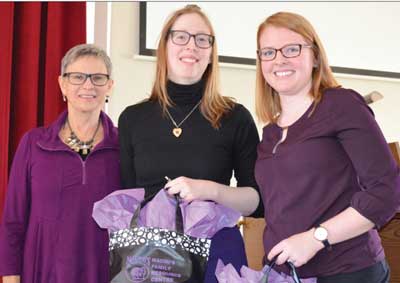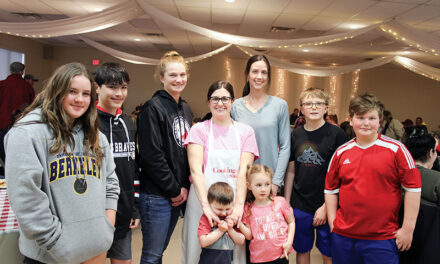Candice Vetter
Record Staff
WINCHESTER — For International Women’s Day on Wed., March 8, Naomi’s Family Resource Centre held its annual luncheon at and catered by St. Clare’s Anglican Church in Winchester, thanking about 100 supporters of the women’s shelter in Winchester, which marks its 30th anniversary this year.
Executive Director Verna Leger spoke briefly, touching on the many events going on around the world, including the presence of all girls and young women in the House of Commons in Ottawa for the day. Vice-President of the centre’s Board of Directors Peggy Malcolm spoke impassionately about the importance of women in the economy in both paid and unpaid work. She noted that in some countries this day was a national holiday.
The three guest speakers from Ault & Ault Law Firm presented legal advice on matters which tend to have an impact on women. Lesley Ault kicked off the discussion by outlining the differences for women going into the practice of law now, compared to when she was a young woman. “Women before me fought the battles (to become lawyers), and I take home the spoils,” she said. “We were near the beginning of a huge wave and I appreciated that.” Ault was told by her father to go into law and she did, becoming the first female lawyer in Leeds and Grenville County, the first lawyer in Dundas County to open her own practice, and other firsts.
Reactions from the legal community differed, she said. A Brockville judge stopped her while she was speaking in court, brought her up front, gave her a gift and said he was so proud to have her, the first woman in her position, in his courtroom.
But there were unpleasant reactions too. She recalled having made all the arrangements for a very important, expensive event, then not being allowed in the club where it was held because it was for men only. She said, “In Cornwall a judge took a strip off my back, and embarrassed me in front of everybody, saying my clothing (she was wearing maternity clothing at the time) was not appropriate for court.” She also heard comments like, “Your husband makes good money, you don’t need to work.”
She was appointed to Legal Aid and is proud of making a change in providing more legal aid to more people. She also questioned why addicts are treated as criminals, rather than persons with a medical problem, and why a woman who fears her husband can’t be helped without going through the criminal justice process. In the Kenora Women’s Prison, she said, 90 per cent of inmates have addiction or serious mental health issues.
Samantha Berry spoke next about the importance of estate planning, including wills and powers of attorney. She explained the difference between power of attorney for property and power of attorney for personal care, in case of incapacitation when one can’t decide for oneself. Living wills are instructions about end of life care; it is a separate document but doesn’t name a specific person.
“I always say talk to your loved ones,” she said. “Tell them what you want, everyone has an estate even if it’s small.” She explained that it is far easier for heirs if there is a will, which can be simple, or even open-ended. If a person dies intestate there are specific rules for division of the estate to next of kin. “The only time the government gets ‘all’ of an estate is if there is no next of kin, even remote.” Times to change a will include when the executor dies or is in a retirement residence, when the person no longer owns property that has been specifically assigned, when marital status changes, unless the marriage is anticipated in the will with a date and fiancé’s name. Otherwise existing wills become null and void on marriage, but not on separation or divorce, so it is very important to have a new will on marriage dissolution. Regarding guardianship of children, many audience members were surprised to hear that guardianship of children is only granted to the named guardians for 90 days, and after that they must apply for custody. “This is a check on the parents’ decision,” said Berry. “Joe might be a good friend, but maybe not a dad.”
Mally McGregor opened by comparing her great-grandmother, who was one of two women in her class in Osgoode Law School, to McGregor’s own law school experience at Queen’s University in which her class was half women. She mentioned women’s strikes taking place on this day in other countries, and pointed out how much of women’s work has historically been ignored in law. She cited the famous Irene Murdoch Supreme Court case in which her 25 years of working on the farm was deemed, “the work of any ranch wife.” Ultimately, the laws were changed to reflect equalization of property. McGregor cautioned that this does not apply to common law spouses. However, in a business arrangement like a farm, the contribution must now be considered, including child rearing. “In lots of cases people were motivated by things that shouldn’t be,” she said. “The difficult cases are where we get laws.”










